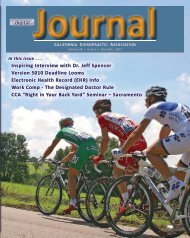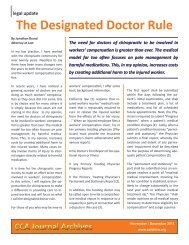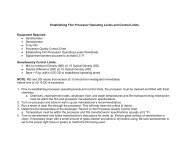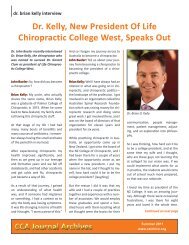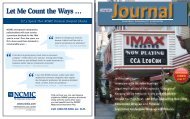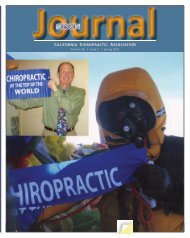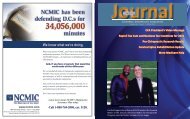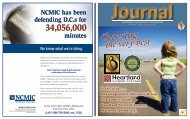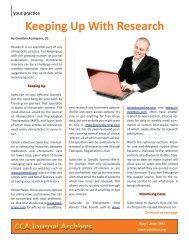Membership Directory - CCA Journal magazine
Membership Directory - CCA Journal magazine
Membership Directory - CCA Journal magazine
You also want an ePaper? Increase the reach of your titles
YUMPU automatically turns print PDFs into web optimized ePapers that Google loves.
code of ethics<br />
by the Committee and the <strong>CCA</strong> and no part of it shall be communicated by the<br />
members of the Board, the Executive Committee, any <strong>CCA</strong> appellate body, the<br />
Committee, the <strong>CCA</strong> staff, or any others who assisted in the proceeding on the<br />
Challenge, to any third parties. However, the final determination may be disclosed<br />
in the following circumstances:<br />
(1) Publication pursuant to Code of Ethics Section IV(3);<br />
(2) Disclosure by a member with the express written permission of the <strong>CCA</strong>;<br />
(3) Disclosure as required in connection with the filing of a<br />
credentialling application;<br />
(4) Disclosure via legal proceeding;<br />
(5) Disclosure by the <strong>CCA</strong> to the Petitioner and the Subject Member.<br />
A Subject Member who is dropped as a result of a determination of a non-observance<br />
may not reapply for <strong>CCA</strong> membership in any class for a period of one<br />
year.<br />
4.06 Appeal.<br />
Any determination of the Committee regarding a Challenge may be appealed to<br />
the Board by the Subject Member or the Petitioner. Any imposition of sanctions<br />
or directives shall not be final until all appeals have been exhausted or the time<br />
period for appeal has elapsed.<br />
All requests for appeals must be made in writing to the Executive Director within<br />
30 days of receipt of notification of a determination. The President shall appoint<br />
an Appeals Hearing Committee composed of one Board member from<br />
each state section as set forth in <strong>CCA</strong> Codified Policy Article 6, Section A.1.d.<br />
Prior to the next regularly scheduled Board meeting, the Appeals Hearing Committee<br />
shall conduct a hearing and deliberation in accordance with the procedures<br />
for hearings set forth in these Administrative Procedures, and shall forward<br />
a recommendation to the Board for final determination, provided that the<br />
appellant has submitted his or her request for appeal sixty days in advance of<br />
such meeting. The only information that may be considered during an appeal<br />
is the information presented in the Submission or at the hearing. The appellant<br />
shall advise the Appeals Hearing Committee in writing of the reasons he<br />
or she believes the Ethics Committee’s determination was in error. After the<br />
appeals body has deliberated, it shall issue its determination to the Petitioner<br />
and Subject Member.<br />
4.07 Rehearings.<br />
Rehearings shall be granted at the sole discretion of the Chairperson only in situations<br />
of extreme extenuating circumstances.<br />
4.08 Resignation During Challenge.<br />
If the Subject Member resigns from the <strong>CCA</strong> at any time during the pendency of<br />
the proceeding on the Challenge, the Challenge shall be suspended without further<br />
action. The entire record shall be kept confidential. If the Subject Member<br />
reinstates his or her <strong>CCA</strong> membership within three years, the Challenge shall be<br />
reinstituted at the time membership is approved. If the Subject Member reinstates<br />
his or her membership three years or more after resigning, the Challenge<br />
may be reinstituted if a majority of the Committee members vote to reinstitute<br />
the Challenge.<br />
5. Conflict of Interest.<br />
Any member of the Committee or the Board who has any personal or financial<br />
interest in the outcome of any Challenge, or who otherwise has a conflict of interest<br />
with respect to the Challenge, shall notify the Chairperson or, in the case<br />
of an appeal, the chairperson of the body conducting the appeal, and immediately<br />
withdraw from participating in the review or appeal of that Challenge.<br />
Examples of such conflicts of interest include, but are not limited to: having<br />
made a complaint to any regulatory or law enforcement agency or the Committee<br />
against the Subject Member; having been the subject of a complaint by<br />
the Subject Member; a Committee member’s (or member of any appeal body)<br />
patient or immediate family member having made a complaint against a Subject<br />
Member, and being the Petitioner in the Challenge. In addition, any member of<br />
any of the above-referenced bodies shall withdraw from participation in deliberations<br />
or determination of any case on appeal if such member participated in<br />
the review of the Challenge as a member of the Committee or as a member of<br />
any appellate body which reviewed the Challenge except to the extent necessary<br />
or useful to advise the present appellate body of the prior reviewing body’s<br />
determinations and deliberations and to explain its decisions.<br />
If a Petitioner or Subject Member believes that a member of the Ethics Committee<br />
has an obligation to withdraw from the review of a case involving him or her<br />
pursuant to the provisions of this Section 5, the Petitioner or Subject Member<br />
may notify the Ethics Committee Chairperson or the <strong>CCA</strong> Executive Director in<br />
writing and request that such Ethics Committee member be withdrawn from<br />
review of the case. If the Executive Director or Ethics Committee Chairperson<br />
receives such a request within the Information Period, the <strong>CCA</strong> shall conduct a<br />
reasonable investigation into the matter and shall determine in its reasonable<br />
discretion whether to withdraw the Ethics Committee member from review<br />
of the case. The decision of the <strong>CCA</strong> shall be binding on the Ethics Committee<br />
member and the parties.<br />
6. Fees.<br />
The Committee may charge an appropriate administrative fee to cover the costs<br />
of holding hearings or appeals. Such fees shall be approved by the Board and<br />
applied uniformly. As a public service benefit, any fee for an ethics review of a<br />
<strong>CCA</strong> member by a patient shall be waived.<br />
7. Limitations on Applicability.<br />
The <strong>CCA</strong> Code of Ethics applies only to <strong>CCA</strong> members. It is enforceable only by the<br />
<strong>CCA</strong>. The <strong>CCA</strong> does not encourage or imply adoption, implementation, or enforcement<br />
of its Code of Ethics by any other organization.<br />
FEES FOR PROCESSING<br />
Ethics Complaints<br />
The following fee structure was approved by the <strong>CCA</strong> Board of Directors at the<br />
May 17-18, 1997 Board of Directors meeting:<br />
Party Who Filed Complaint Appeal<br />
Patient or Civilian Zero $ 100.00<br />
Insurance Company $ 100.00 $ 250.00<br />
Attorney $ 100.00 $ 250.00<br />
<strong>CCA</strong> Member Doctor $ 100.00 $ 250.00<br />
Non-<strong>CCA</strong> Doctor $ 250.00 $ 500.00<br />
Page 154 California Chiropractic Association 2010-11 <strong>Membership</strong> <strong>Directory</strong> Page 155



